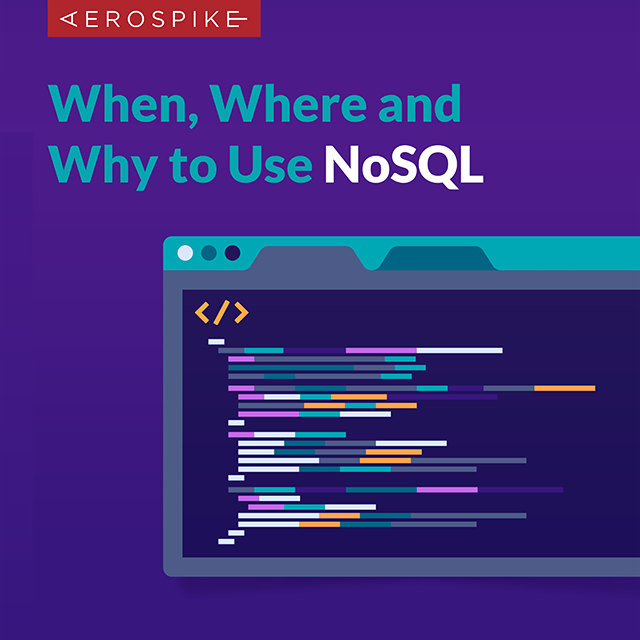View eBook
When, Where & Why to Use NoSQL?
View eBook
When, Where & Why to Use NoSQL?
What is NoSQL? When, Where & Why?
Big data is becoming a big challenge for enterprises. Many organizations have built environments for transactional data with Relational Database Management Systems (RDBMS), but are now inundated with enormous amounts of new data types from social media, clickstream data, machine data, geolocation data and more. In addition, many companies are building digital business apps that require speed, uptime and performance. Read When, Where & Why to Use NoSQL? to learn:
- The biggest challenges of managing big data
- Database requirements for dealing with big data
- Why NoSQL databases solve big data challenges
- How Aerospike’s NoSQL database solution provides predictable performance, high availability and low total cost of ownership (TCO)
Why Move to NoSQL?
Using NoSQL does not necessarily involve scrapping your existing RDBMS and starting from scratch. NoSQL should be thought of as a tool that can be used to solve the new types of challenges associated with big data. There may be business processes that can continue to be addressed effectively with RDBMS. But with the new challenges presented by big data, you will likely face new problems that can be solved more efficiently – and more cost-effectively – with a NoSQL database.
A NoSQL database can be used to solve new problems that require:
- Scalability – A NoSQL database can scale horizontally to the scale required by big data. Applications can run in parallel on a cloud-based cluster comprising of dozens,hundreds, or even thousands of commodity servers. The NoSQL scale-out architecture enables web applications to scale dynamically up to thousands or even millions of users. As the number of concurrent users grows, you can dynamically add more cluster nodes (commodity servers) to process the additional load.
- Flexibility – A schema-less NoSQL database can process and store structured, unstructured and semi-structured data, and enable flexible and rapid development of applications and use cases such as right-time decisioning, recommendations, profile management, bidding, and risk profiling. With RDBMS, you cannot add data (columns) without updating the entire schema, which can take hours or even days, depending on your institutional infrastructure. With NoSQL, data can be added and updated flexibly and efficiently.
- Speed – The parallel processing nature of a NoSQL database, along with caching and aggregation, can provide fast (sub-millisecond) transaction response times at scale.
- Developer productivity and agility – A NoSQL database shortens time to market for new applications and updates because developers don’t have to shoehorn data into a fixed schema. With NoSQL, applications can be rapidly prototyped, tested, and deployed into production in a cloud-based cluster.
- Operational readiness – In contrast to RDBMS, which typically require schema migration scripts, significant manual effort, and scheduled downtime for release upgrades, NoSQL schema migrations are relatively easy and have minimal impact on operational readiness. Maintenance windows are compressed, and the performance impact on users is far less noticeable.
Big data is becoming a big challenge for enterprises. Many organizations have built environments for transactional data with Relational Database Management Systems (RDBMS), but are now inundated with enormous amounts of new data types from social media, clickstream data, machine data, geolocation data and more. In addition, many companies are building digital business apps that require speed, uptime and performance. Read When, Where & Why to Use NoSQL? to learn:
- The biggest challenges of managing big data
- Database requirements for dealing with big data
- Why NoSQL databases solve big data challenges
- How Aerospike’s NoSQL database solution provides predictable performance, high availability and low total cost of ownership (TCO)

